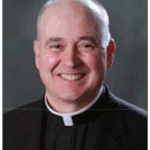(Pastor’s Note from the Mary Immaculate of Lourdes Parish Bulletin for August 26, 2012)
In last Sunday’s bulletin note I presented the Catholic Church’s approach to dogma, which is to carefully make distinctions among different grades of theological certainty. Some things are to be believed with the certainty of faith, de fide, whereas other things are less theologically certain but are still part of Catholicism.
Another way to appreciate these distinctions is to contrast them with the theological censures, that is, the judgment that certain things are contrary to Catholic Faith and Morals or at least doubtful. Here follows a list of the theological censures:
- Heretical Proposition: false teaching, a proposition that is opposed to a formal dogma, e.g. God is not a Trinity of Persons is a heretical proposition.
- Proximate to Heresy: a proposition which goes against a truth which is proximate to the Catholic Faith, e.g. the belief that Jesus Christ did not actually sin, but also could not sin is a truth proximate to the Catholic Faith: to deny or question it would be a proposition “Proximate to Heresy”.
- Savoring or Suspect of Heresy.
- Erroneous Proposition: a proposition which contradicts a teaching proposed by the Church as intrinsically connected with Revealed Truth or opposed to the common teaching of theologians, e.g., a denial that Original Sin consists in the deprivation of grace caused by the free act of sin committed by the head of the human race is an erroneous proposition.
- False Proposition: contradiction of a dogmatic fact, e.g., that St. Peter established his episcopate in Rome is a dogmatic fact.
- Temerarious Proposition: deviation without reason from the general teaching of the Church.
- Offensive to Pious Ears: a proposition made which is offensive to religious feeling, even if not, strictly speaking, untrue.
- Proposition Badly Expressed (male sonans): a proposition subject to misunderstanding by reason of its method of expression.
- Captious Proposition: reprehensible because of its intentional ambiguity.
- Proposition Exciting Scandal.
(Source: Fundamentals of Catholicism, Dr. Ludwig Ott, Introduction, “Theological Grades of Certainty”, 4th edition, A.D. 1960)
In the life of the Church over the last few decades the faithful have been subjected to many things from individuals who can claim to have an official status within the Church, as priests, consecrated religious, professional pastoral ministers or theologians. They declare things which are quite deserving of one or more of the Theological Censures on this list. I know that I have heard and read things, particularly touching upon the humanity of Jesus and Mary, which should fall under the censures—at least—of “Offensive to Pious Ears”, “Badly Expressed”, “Captious” and “Exciting Scandal”.
It is no longer the practice for Church authority to publicly and formally impose censures, except in the most egregious cases. Pope John XIII set the tone for our times in the early 1960s when he said that the Church of today should prefer to use “the medicine of mercy” in place of her historical recourse to condemnations, the anathemas.
For our own protection, however, we need to allow our “sense of faith” to register both reserve and disapproval when we hear things asserted by an official or professional Catholic which strike us as unsound and not the “Faith of our Fathers”. The spirit of our age is particularly marked by flippancy, irreverence, and a reflexively oppositional attitude towards traditional morality. It is not surprising that we should find these things within the Household of Faith. Nevertheless, we have to push back against them for the sake of the integrity of our own faith-life.
